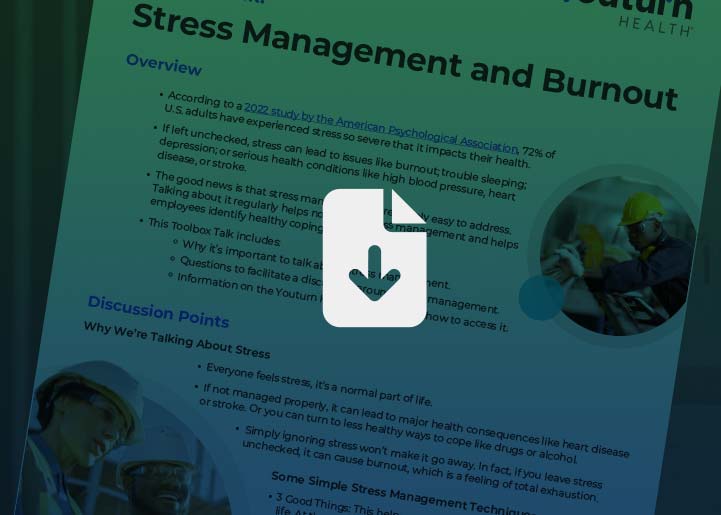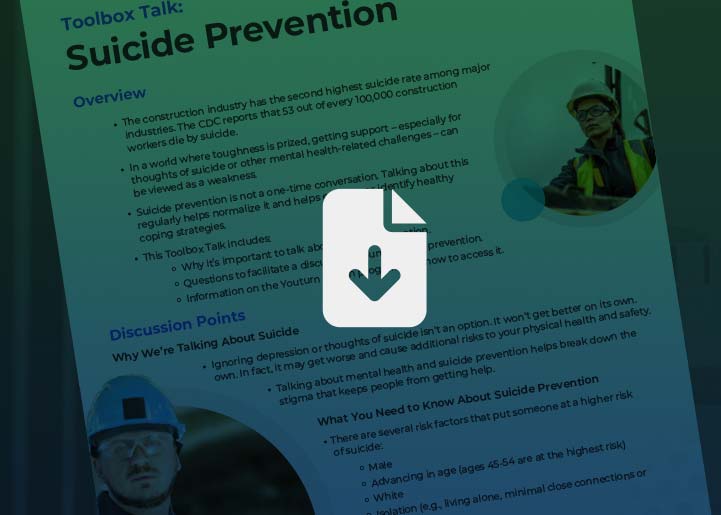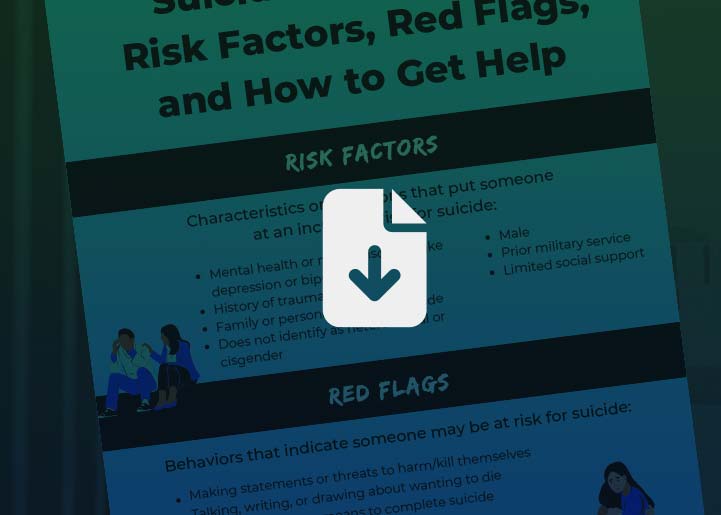Mental Health Awareness
The Construction Industry Accounts for 20 percent of the Nation’s Suicides
According to the Centers for Disease Control and Prevention, the construction industry has the second highest suicide rate among major industries, as 53 out of every 100,000 construction workers die by suicide per year.
Additionally, construction workers represent about 25 percent of fatal opioid overdoses among all workers.
The LMCT is Here to Help.
Suicide is no longer a taboo subject in the union construction industry, especially in the Insulators Union. Through our partners YouTurn Health and All One Health, we are seeking to provide our Brothers and Sisters with the help they need.

Need Immediate Help From a Professional?
Click the button below if you need immediate help and need to speak with a professional.
ToolBox Talks
Stress Management and Burnout
According to a 2022 study by the American Psychological Association, 72 percent of U.S. adults have experienced stress so severe that it impacts their health.
- Why it is important to talk about stress management.
- Questions to facilitate a discussion around stress management.
- Information on the YouTurn Health program and how to access it.
ToolBox Talks
Suicide Prevention
- Why it is important to talk about suicide prevention.
- Questions to facilitate a discussion around suicide prevention.
- Information on the YouTurn Health program and how to access it.
Suicide Prevention
Risk Factors/Warning Signs
Risk factors include:
- Mental illness in the individual or their family
- Traumatic events
- Being a military member, first responder or construction worker
- Not having a strong support system
- Substance use
- Bullying
- Social isolation
Warning signs may include:
- Increased isolation
- Talking about being a burden
- Mood swings
- Anxiety or anger
- Expressing hopelessness
- Making comments about “leaving” or “dying”
How to Help Someone Who Is Struggling
Here are some ways you can help with suicide prevention
- If and when you can, reach out to that person at work or school who seems lonely and might need a friend.
- Strengthen bonds with those you feel comfortable with and be vocal about your love and support. Let people know that you are a safe person for them to confide in and are willing to be a person that can open up to.
- If you know someone that you think might be struggling, ask them directly.
- If someone confides in you, help them find support and resources.
- Start with the Suicide and Crisis Lifeline. They can call or text 988 or join an online chat at 988lifeline.org.
May is Men’s Mental Health Month and PTSD Awareness Month

Men’s Mental Health: It’s More Than Just “Be A Man”
American culture puts a lot of responsibility on men to be the “STOIC” leader of the family, whereas women are expected to be the nurturing, sensitive, soft ones, when truly we are all capable of being well-rounded, emotionally intelligent people. There may be a difference in the way each gender processes stress and emotions, but it does not mean that either one is incapable of showing humility and strength, and being honest and open.
Discover why emotional reactions, or moments with uncontrollable emotions, is ok and bound to happen.

Alternatives to Therapy for Men’s Mental Health
While traditional therapy is a valuable resource for many, it’s not the only option for managing mental health. And let’s be honest — sometimes therapy feels a little too much like asking for directions. You know you need it, but you’d rather figure it out on your own.
This blog explores various alternatives that can be effective in promoting mental wellbeing for men who may not have access to therapy or prefer other approaches.
May is also PTSD Awareness Month
Treating PTSD and Processing Stuck Memories

Over the course of their lives, about 6% of Americans will experience Post-Traumatic Distress Disorder (PTSD), and as many as 29% of military veterans experience symptoms of PTSD during their lives.
PTSD occurs when either you or a loved one is exposed to a life-threatening, traumatic situation. “You define whether it was life-threatening,” explains Richard Jones, Chief Clinical Officer at Youturn Health. “Your perception of the event is what’s important.” This traumatic situation could be a one-time event or it could be something that happens over and over again.
Military Sexual Trauma (MST): What it Means and Where to Get Support

Military sexual trauma (MST) refers to sexual assault or threatening sexual harassment during military service. It includes any sexual activity to which a person doesn’t consent or is unable to consent (e.g., while asleep or intoxicated).
MTS can affect anyone regardless of gender, sexual orientation, age, or branch of service. Generally speaking, studies show that 16% of all military personnel and veterans experience MST; 38% of women and 4% of men reported being victims.
Read this blog to learn where to get help and discover additional resources.
PTSD Vidoes



